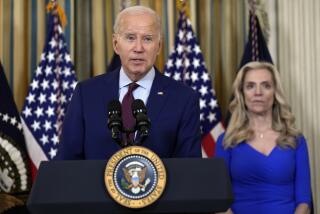Trade Talks Turn Into Lengthy Complaint Session : In 9-Hour Meeting, U.S. Presents Japan With Detailed List of Problems, Reforms
- Share via
TOKYO — Depicting themselves as friends of Japan’s consumers, Bush Administration officials spent nearly nine hours Monday outlining the most exhaustive list of complaints against Japanese business practices that the United States has ever issued.
They demanded reforms of systems, regulations, business practices and customs that they said impeded imports, kept prices artificially high and even restricted leisure and said the United States is prepared to respond, in kind, with reforms of its own.
The so-called Structural Impediments Initiative negotiations, which will continue through next summer, “is a process that is a two-way street and will take cooperative efforts on the part of both governments to be a success. Both of us have work to do and policy to change. Both sides need to take action and take action soon,” an American official said.
Success in the talks, he added, “is vital to our relationship.”
Improving Quality of Life
He and three other officials, who spoke on the condition they not be identified, said a second day of talks today would be devoted to an airing by Japan of its complaints against structural defects in the American economy which Japanese officials say are impeding a correction of the $50-billion trade imbalance between the two countries.
All four U.S. officials described the American demands as designed to remove obstacles to access to Japan’s market and increase sales of U.S. products--while, at the same time, “improving the quality of life for Japanese consumers” by increasing their purchasing power and lowering prices.
“Japan needs to start giving its consumers a break and become an ‘import superpower’ at the same time,” one of the Washington officials said.
With time out only for lunch and coffee breaks, the presentation of American complaints started at 9 a.m. and finished after 8 p.m. One of the U.S. officials said the actual time spent in discussions was nearly nine hours.
The Washington delegation charged, for the first time, that the “government sector” in Japan “is beginning to show a substantial and growing surplus”--despite more than a decade of deficits in Japan’s national budget. When questioned about his remark, the official back-tracked, saying, “We have some further work to do with our Japanese counterparts” in defining what is meant as a surplus.
Anti-Competitive Complaints
He complained, nonetheless, that public spending on infrastructure had “fallen short in recent years,” and said, “Why not channel some of (the) surplus into roads, airports, sewers and public parks?”
Another official complained that Japan permitted even anti-competitive practices that violate Japanese law, such as bid-rigging and “group boycotts” against foreign products.
U.S. complaints were leveled against what the Americans regarded as policies that prevent land from being made available to housing, public investment and business use. “Lack of true competition” in wholesaling and retailing, as well as in trucking and air transportation, was criticized. Business practices that exclude new firms from entering markets and prevent mergers and takeovers also were singled out.
Last Friday in Washington, President Bush told Prime Minister Toshiki Kaifu that the structural talks must produce concrete results by next spring.
Treasury Secretary Nicholas F. Brady told Kaifu that only by setting up the structural talks was the Bush Administration able to prevent Congress from taking unilateral action against Japan and said the negotiations must demonstrate that problems with Japan can be settled through talks.
Kaifu, however, replied that the structural problems were “deep-rooted” and said he could offer no guarantee of results by next spring, when what U.S. officials called an “interim statement” on the negotiations will be issued.
A final report is to be issued next summer.
Loss of Power
Analysts in Tokyo said that Kaifu and the ruling Liberal Democratic Party will seek to postpone promises that could threaten the party’s grasp on power until after an election is held for the lower house of Parliament, which elects the prime minister. It must be called by July, 1990.
The Liberal Democrats on July 23 lost an upper house election--and the ability to enact legislation unilaterally--for the first time in their history.
More to Read
Inside the business of entertainment
The Wide Shot brings you news, analysis and insights on everything from streaming wars to production — and what it all means for the future.
You may occasionally receive promotional content from the Los Angeles Times.










